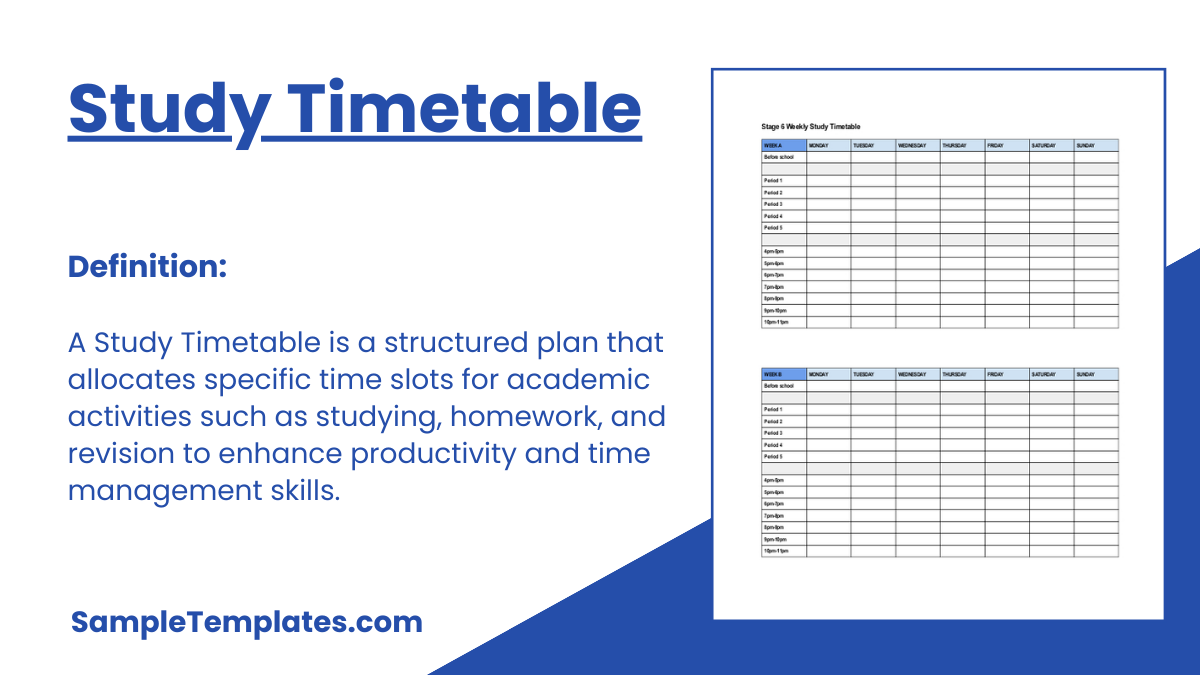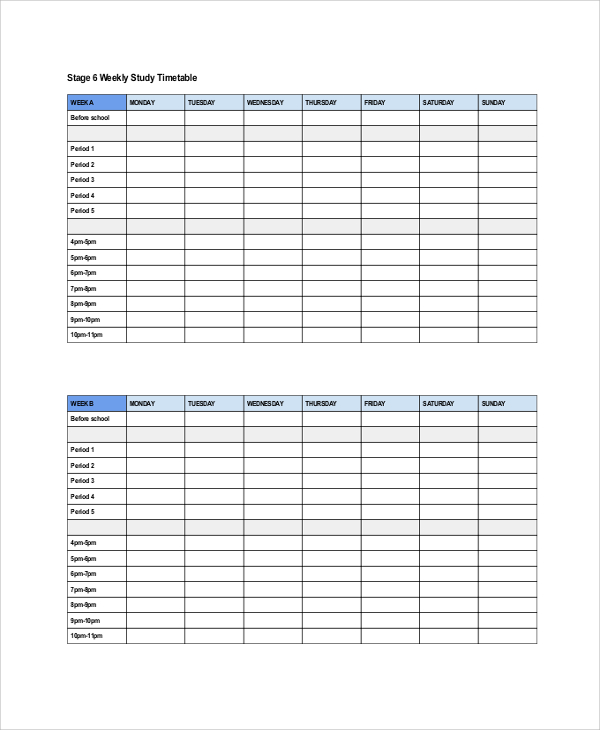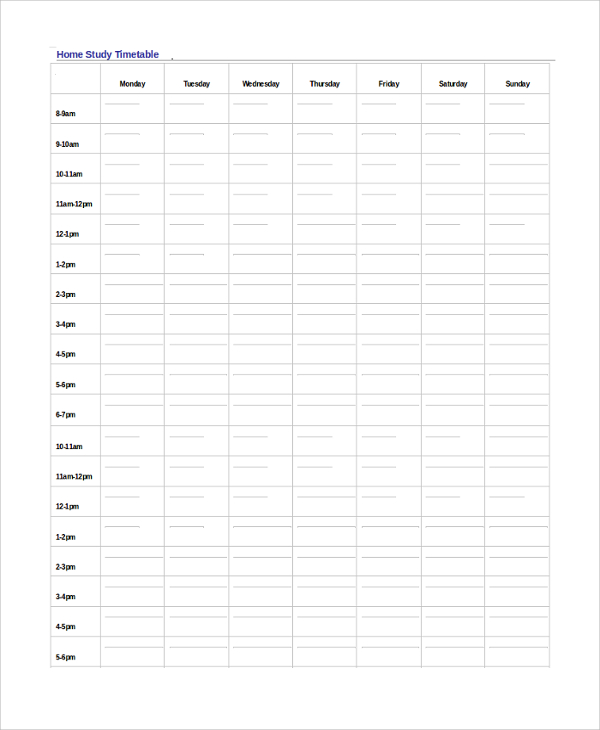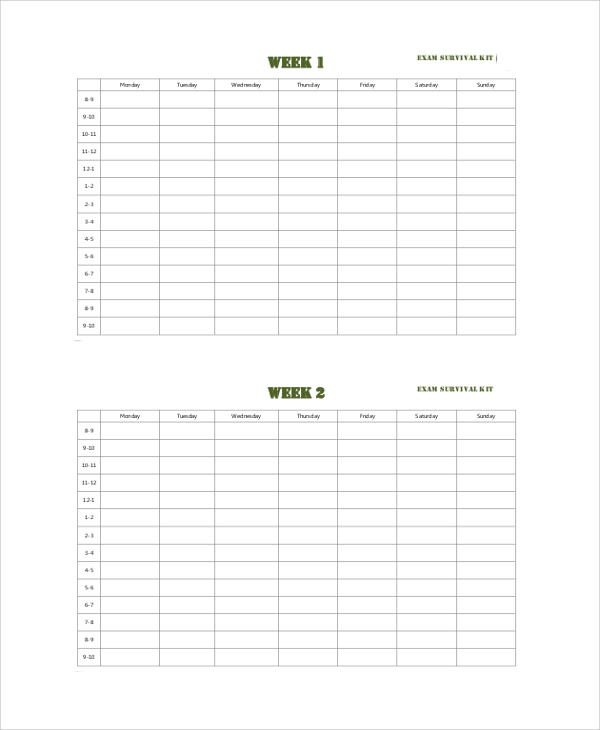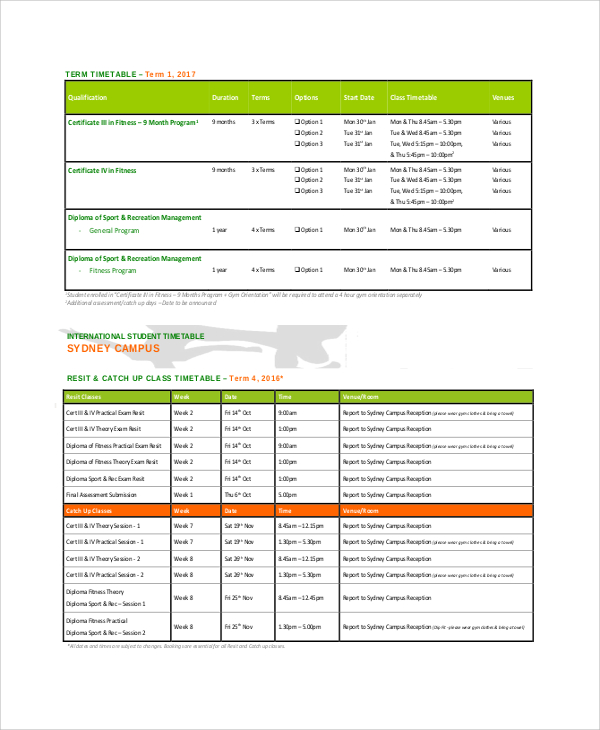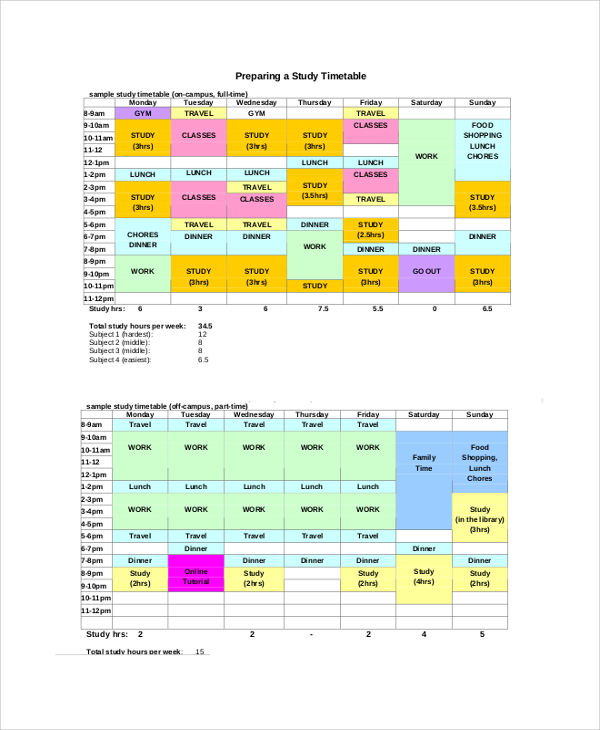Students need to follow a timetable or a sample schedule for studying. Following a timetable or schedule helps them to make use of the time in a better way. Teachers suggest following timetable to students during examinations. However, this process of studying can be followed throughout the year. To organize your studying sessions at home, you need to create a perfect timetable. To create a perfect timetable, you can consider downloading Daily Timetable Samples. Using samples for online study planner helps students to stay organized with their studies.
Study Time Table PDF
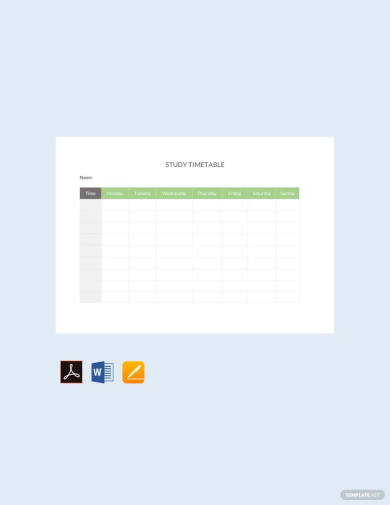
Time Table Chart For Study

Benefits of Using Studying Timetable
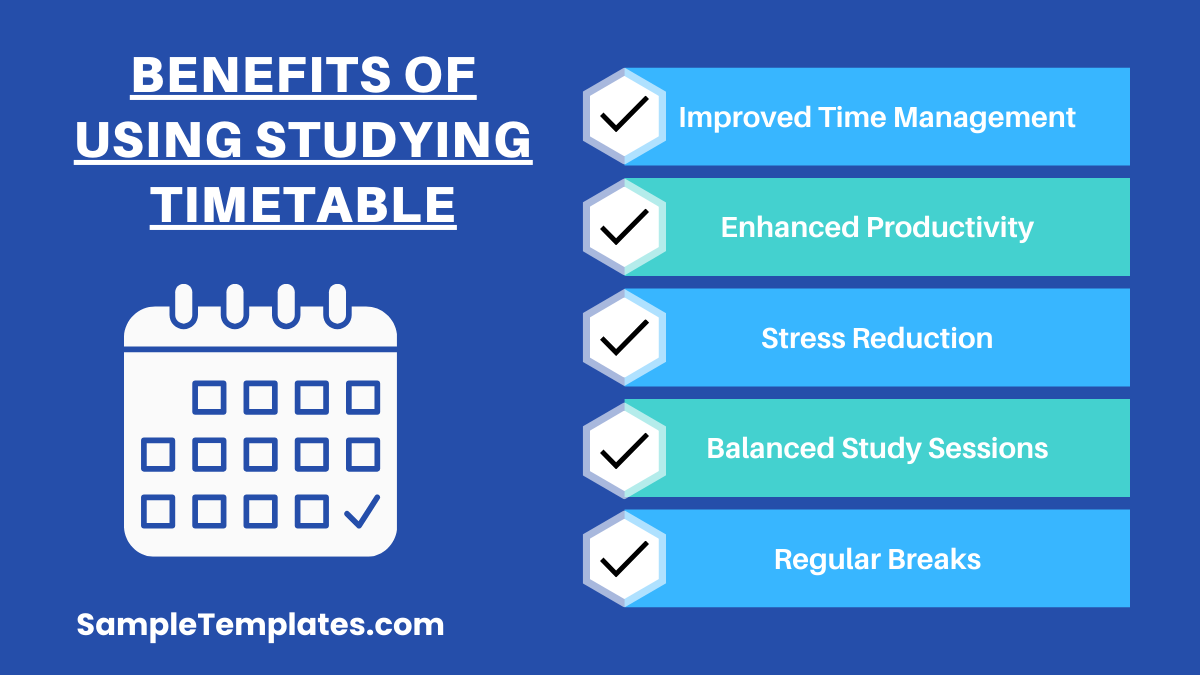
Using a study timetable offers several significant benefits that can enhance academic performance and personal management:
- Improved Time Management: A study timetable helps allocate specific time slots for different subjects, ensuring that all topics are covered systematically and no subject is neglected.
- Enhanced Productivity: By organizing study sessions ahead of time, students can minimize wasted time and distractions, making their study hours more productive.
- Stress Reduction: Knowing exactly when and what to study reduces anxiety about preparation and deadlines, as it provides a clear plan to follow.
- Balanced Study Sessions: A timetable allows for the distribution of study sessions in a way that avoids cramming, promoting better retention and understanding of material.
- Regular Breaks: Including breaks in the sample timetable ensures that students maintain high levels of concentration and avoid burnout.
- Goal Setting: Timetables help in setting and achieving short-term and long-term academic goals by breaking them down into manageable tasks.
- Flexibility: While it provides structure, a good study timetable also allows flexibility to adjust study plans based on progress and changes in schedule.
- Motivation Boost: Checking off completed activities from a timetable can increase a sense of accomplishment and motivation.
- Better Sleep Patterns: By scheduling study times, students can also regulate their sleeping patterns, ensuring they get enough rest.
- Consistency and Discipline: Regularly following a structured study plan fosters discipline and helps develop consistent study habits, crucial for academic success.
These benefits make a study timetable a powerful tool for students aiming to maximize their academic potential and manage their time effectively.
Study Timetable Template Free Download
Studying timetable can be crafted in different formats. It can be hourly based or day based or even weekly based. This is a weekly based on study timetable format for you.
Timetable For Study For A student At Home
Although we follow a fixed schedule templates or routine for studying at school, for studying at home, students often stay unorganized. Create your timetable for studying at home and make better use of time.
Importance of Study Timetable
A study timetable is a crucial tool for students, offering numerous benefits that enhance learning and academic success:
- Structured Learning: It provides a structured approach to studying, ensuring that time is allocated efficiently to cover all necessary subjects and topics systematically.
- Avoids Overload: A timetable helps distribute study loads evenly over days or weeks, preventing the stress and ineffectiveness of last-minute cramming.
- Increases Focus: By setting specific times for study, students are more likely to minimize distractions and concentrate better, leading to more productive sessions.
- Enhances Time Management: Students learn to manage their time effectively, balancing academic responsibilities with extracurricular activities and personal time, which is a valuable skill for lifelong success.
- Promotes Regular Review: Regular intervals for review are built into the timetable, which enhances understanding and retention of information, a key to doing well in exams.
- Reduces Anxiety: Knowing that there is a plan in place to cover all learning material before exams can significantly reduce anxiety and boost confidence.
- Tracks Progress: Students can monitor their progress and adjust their study habits and strategies based on what is or isn’t working.
- Encourages Independence: Using a study timetable encourages students to take responsibility for their own learning, fostering independence and self-discipline.
- Optimizes Performance: By ensuring regular and balanced study sessions, timetables help maximize academic performance and potential.
- Prepares for Professional Life: The discipline and time management skills developed from following a study timetable are also essential qualities in professional life.
Overall, a study timetable is not just about managing study hours; it’s a comprehensive tool that prepares students for both academic and life challenges by fostering essential skills like time management, discipline, and organization.
Exam Timetable Template PDF
Examination time is really crucial for every student. This is the time management when you need to organize your study schedules so that all the studied chapters can be revised well. Create an exam time timetable with this sample.
Study Timetable For Students
Blank Study Timetable Template
Size: 46 KB
Download
Tips For Preparing a Study Timetable

Creating an effective study timetable is key to managing your academic workload efficiently. Here are some tips to help you prepare a study timetable that enhances your learning experience:
- Assess Your Schedule: Start by assessing all your commitments including school, work, extracurricular activities, and personal time. This will help you understand how much time you realistically have for studying each day.
- Prioritize Subjects: Identify which subjects require more time and attention based on their difficulty or your proficiency in them. Allocate more time to challenging subjects while ensuring that all subjects are covered.
- Set Specific Goals: For each study session, set specific goals. This could be as detailed as which chapters to read or which exercises to complete. Having clear objectives helps keep your sessions focused.
- Include Breaks: Incorporate short breaks between study sessions to prevent burnout. The Pomodoro Technique, which involves 25 minutes of focused work followed by a 5-minute break, can be particularly effective.
- Be Flexible: While it’s important to stick to your timetable, be flexible enough to adjust it as needed. If you find that you’re consistently needing more time for a subject, revise your timetable to accommodate this.
- Consider Your Peak Times: Schedule your study sessions during times when you are most alert and productive. If you’re a morning person, schedule challenging subjects earlier in the day.
- Review and Adjust Weekly: At the end of each week, review your progress and adjust your timetable based on what was or wasn’t accomplished. This helps you stay on track and refine your study habits.
- Use Tools: Utilize tools such as apps, calendars, or sample planners to keep your timetable organized and easily accessible. Digital tools can also send reminders and help you track your progress.
- Consistency Is Key: Try to start and end your study sessions at the same time each day to establish a routine. Consistency helps to build a habit, making it easier to stick to your timetable.
- Stay Realistic: Don’t overload your schedule. Ensure that your study timetable is realistic and leaves room for rest, social life, and other responsibilities.
By following these tips, you can create a study timetable that not only fits your personal schedule but also maximizes your academic performance.
High School Study Timetable Template
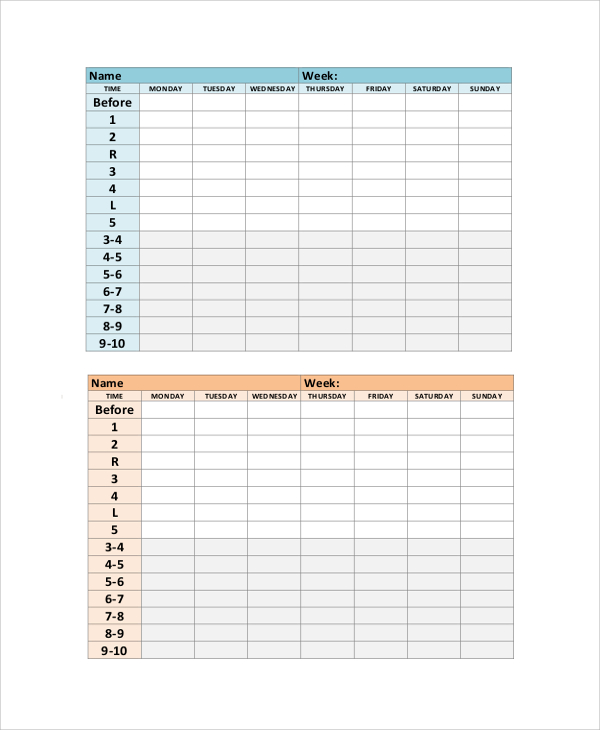
glenmorepk-h.schools.nsw.edu.au
Details
File Format
Size: 235 KB
Download
Best Study Time Table PDF
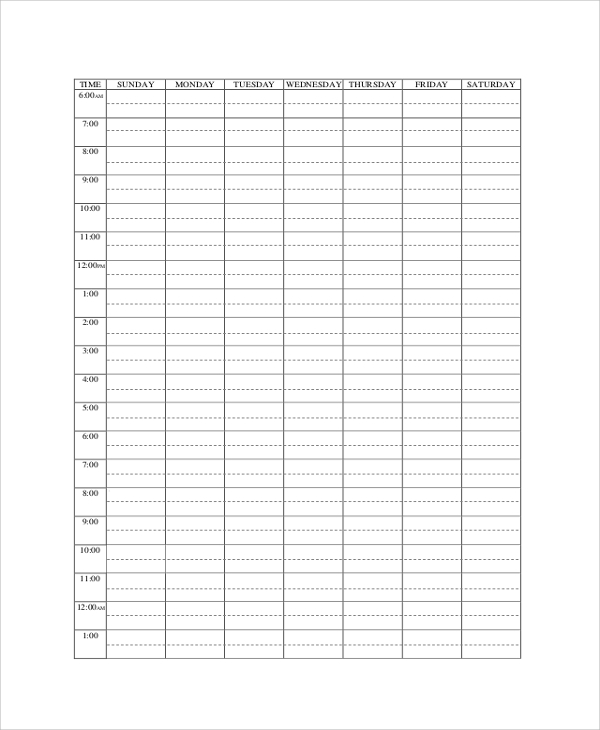
umanitoba.ca
Details
File Format
Size: 30 KB
Download
Uses and Purposes Creating of Study Timetable
The process of learning should be systematic, and this is why schools give stress on creating studying sessions or schedules for the students. Though we follow schedules or routines for studying at school, we often stay unorganized at home. We do not maintain any studying schedule at home, and as a result, we fail to miss important deadlines or assignment submission dates. Moreover, preparations during examination remain incomplete as we do not follow study timetables or schedules. This is why creating a timetable or schedule for studying at home is important for every student. It helps in learning better with efficient sample time management as well.
Who Should Use Study Timetable Samples?
We all understand the importance of having timetables for studying, but we tend to ignore creating a timetable for studying at home. One of the main reasons for failing to create a timetable at home is the lack of knowledge or expertise in creating a timetable. In fact, it is not at all easy to craft a timetable. Different kinds of timetables could be there, starting from Weekly Timetables and ending to hourly studying timetables. You need to understand your requirement first. Once you know the need for creating a timetable, you can follow some online samples to craft your own timetable. You can easily download these samples.
What is the best time table to study?
The best study timetable varies by individual preferences and commitments, but typically involves consistent, well-spaced study sessions, with breaks and active recall techniques to enhance learning and retention.
Which schedule is best for study?
The best study schedule is one tailored to your personal preferences and peak productivity hours. It should include regular, focused study sessions, breaks, and a balance between subjects or topics.
How do I create a study timetable?
To create a study timetable, identify your goals, prioritize subjects or topics, allocate specific time slots for study, factor in breaks, and remain flexible to adjust as needed for effectiveness.
What makes a good study schedule?
A good study schedule is well-structured, balanced, realistic, and tailored to your goals and preferences. It should allow for regular, focused study sessions with breaks and adaptability.
Which time is not best for study?
Late at night or very early in the morning may not be the best times for study for most people due to reduced alertness and fatigue. It varies by individual.
In conclusion, this study timetable is a personalized roadmap for efficient and effective learning. By adhering to this schedule, you optimize time management, maintain focus, and promote a balanced approach to academics. Regularly revisiting and adjusting this timetable ensures sustained productivity and sets the foundation for academic success.
If you have any DMCA issues on this post, please contact us!
Related Posts
Ukulele Chord Chart Samples & Templates
Retirement Speech Samples & Templates
Weekly Schedule Samples & Templates
Contractual Agreement Samples & Templates
FREE 9+ Amazing Sample Church Bulletin Templates in PSD | PDF
Sample Business Card Templates
Sample Cashier Job Descriptions
Questionnaire Samples
FREE 10+ Sample HR Resource Templates in PDF
FREE 10+ HR Consulting Business Plan Samples in MS Word | Google Docs | Pages | PDF
FREE 49+ Sample Job Descriptions in PDF | MS Word
FREE 16+ Nonprofit Budget Samples in PDF | MS Word | Excel | Google Docs | Google Sheets | Numbers | Pages
FREE 13+ Academic Calendar Templates in Google Docs | MS Word | Pages | PDF
FREE 10+ How to Create an Executive Summary Samples in Google Docs | MS Word | Pages | PDF
FREE 23+ Sample Event Calendar Templates in PDF | MS Word | Google Docs | Apple Pages
